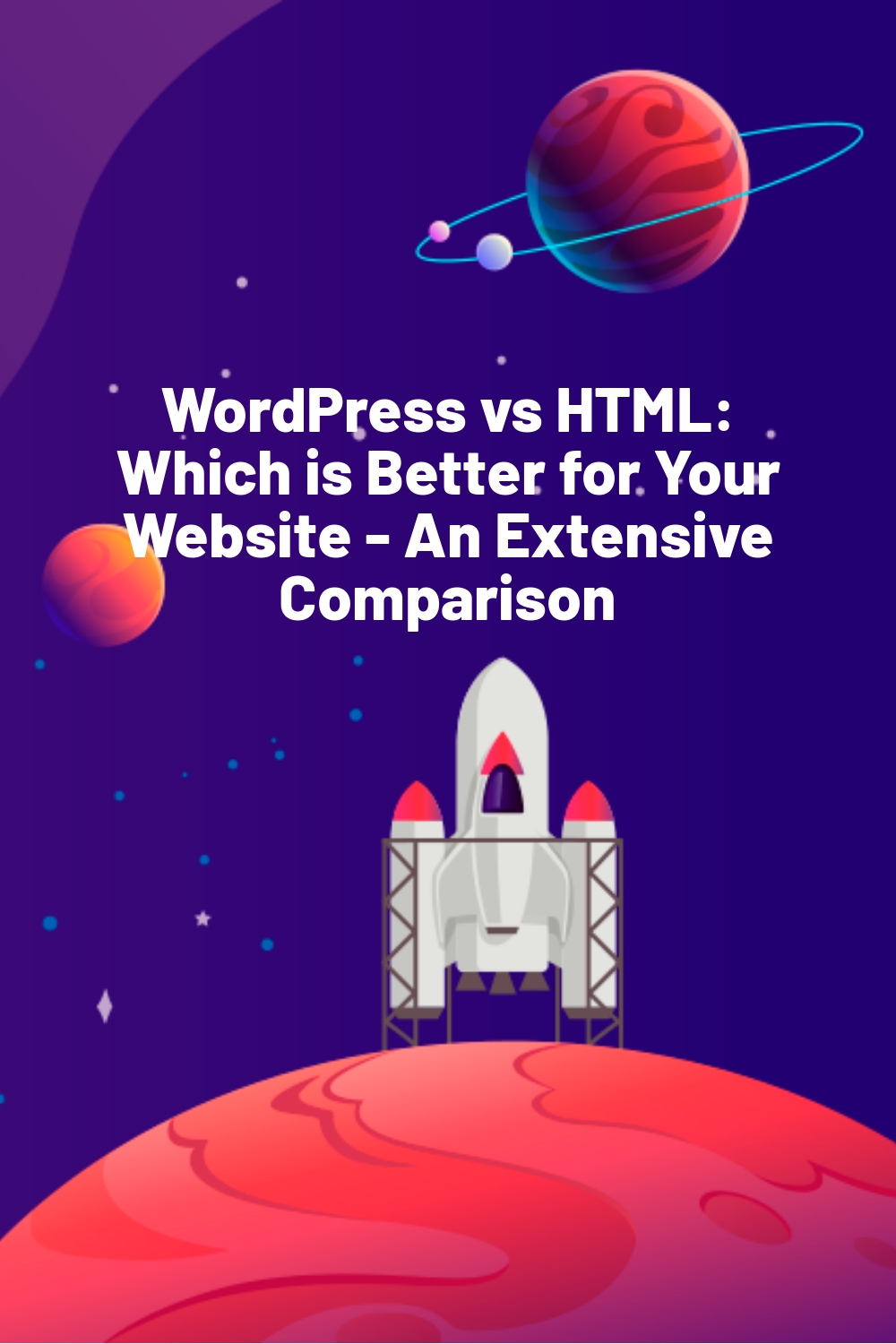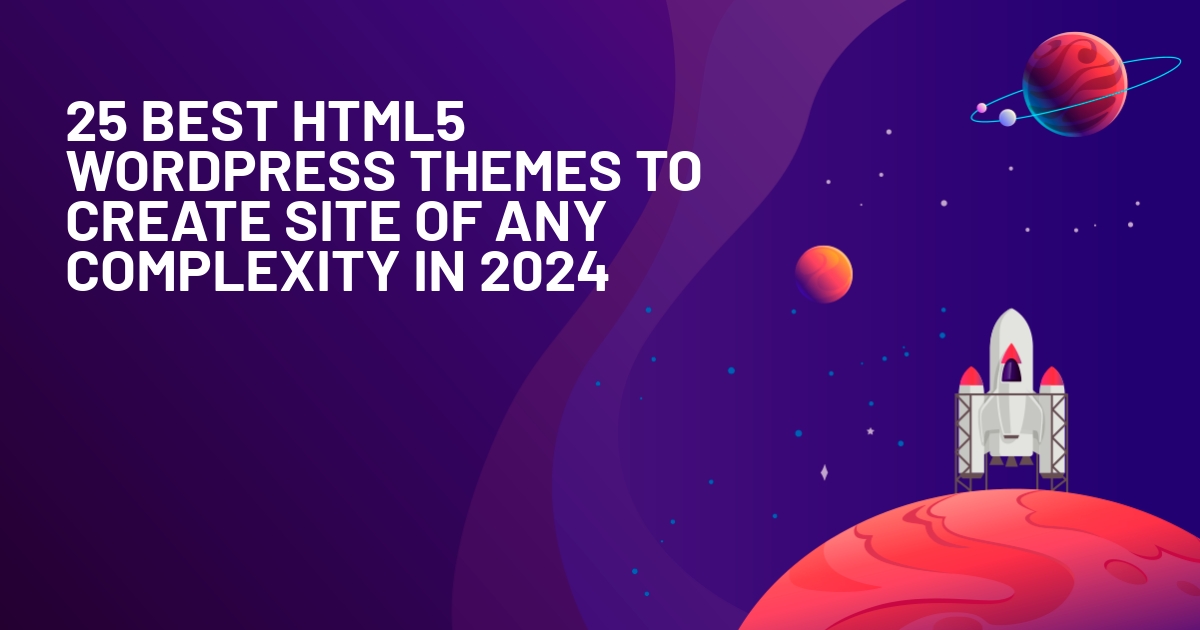WPLift is supported by its audience. When you purchase through links on our site, we may earn an affiliate commission.
WordPress vs HTML: Which is Better for Your Website – An Extensive Comparison
Wondering whether you should use WordPress vs HTML to build your new website?
WordPress is one of the most popular website builders and around 500+ websites are built daily.
It can seem that everything revolves around WordPress since there are hundreds of thousands of themes, and thousands of plugins, but is WordPress the go-to option for building your website?
Having your website built with only a couple of clicks is convenient, but is there any benefit to going back to the old days where websites were built from scratch using HTML?
Down below, we’ll discuss the most important aspects of creating your website using WordPress vs coding so you know what awaits you, so keep on reading!
What is WordPress?

WordPress is the leading platform content management system written in PHP and is paired with MySQL database.
This integrates the content management system with themes and plugins.
I should also mention that WordPress is an open-source system, so from the moment you download it and install it on your hosting, you can start modifying it to create a unique website.
Therefore, you can think of WordPress as a complete package that gives you everything your new website will need to fully manage it and build it out from there.
While you can download the open-source WordPress system and install it on any hosting, you can also host your website directly at WordPress.com.
What is HTML?
HTML stands for hypertext markup language and it’s more known as a language for documents designed to be displayed in the internet browser.
For many skilled coders, HTML is a way to create a custom website from scratch that can combine with Javascript and other scripting languages.
HTML was the primary way of building websites but if you have a look at websites designed two decades ago – you would agree that they look really basic for today’s standards.
However, with the evolution, HTML developed too and skilled coders can create as good (if not better) looking websites as websites built on content management systems such as WordPress.
WordPress VS HTML
Both WordPress and HTML have their advantages and disadvantages. I split this comparison review into 10 important categories to show you exactly what to expect from both options.
WordPress manages a website and its content without directly interacting with the code. On the other hand, HTML is a code that represents the website and is the part of the finished website that has no processes in the background.
People might not even notice the difference visually – but which one is better? Read on to find out!
Ease of Use
The most significant benefit of WordPress is code elimination. You can create a website without ever seeing the code, and also means that you can update and design your website without having to write a single line of code.
The graphic interface is probably one of the reasons WordPress is one of the most popular website platforms.
On the other hand, HTML offers no graphic interface and everything happens in the code. If you’d like to create content – you’ll have to do it within the code.
If you’d like to change the way your site functions, you’ll have to do it in the code. You get the idea.
Therefore, WordPress definitely wins the Ease of Use category.
Cost
WordPress is a free system you can use since it’s open-source but keep in mind that you’ll have to pay for your own hosting.
If you decide to host your website directly at WordPress.com, you won’t have to pay for hosting and it won’t cost you anything. However, keep in mind that you will have limited ownership of the website this way.
When it comes down to HTML, if you are a skilled coder, you won’t have to pay anyone to write a code for your website. If not, you won’t only have to hire a coder to write your website, but you will also have to keep the coder employed as you’ll need him every time you need to make changes to your website.
If you decide to build an HTML website, you’ll need a hosting plan which can cost anywhere between $5 – $25 per month.
Therefore, the cost category is a tie between WordPress and HTML. The cost will mostly depend on your needs and situation.
Security

Even though content management systems such as WordPress are well-protected and they feature dozens of plugins that can keep your website safe. Sometimes, you just can’t be 100% safe.
Such systems can be exploited and hackers do their best to find a loophole in every new update. And when you consider the themes and the number of plugins an average WordPress site uses (about 10 plugins), they also become a potential entry point for hackers.
On the other hand, HTML is a static code, and HTML websites don’t have any processes running in the background. With that being said, there’s less chance for hackers to exploit a static HTML website.
So when it comes down to security, HTML wins this category.
Search Engines
There was a word going out that HTML websites have a better loading speed because they’re static and don’t run any background processes. This also led people to believe that HTML websites tend to be ranked better in search engines.
However, this was never officially confirmed. HTML websites can easily achieve a better page loading speed, but some great WordPress themes also allow a decent loading speed.
Therefore, when it comes down to search engines and rankings, the type of website doesn’t matter – but you should keep an eye on the loading speed.
With that being said, it’s a tie between WordPress and HTML for the search engines category.
Plugins
Plugins are the second biggest advantage of WordPress as they allow greater integration to build complex websites visually a lot quicker.
HTML websites don’t come with any running plugins and yet everything you require gets built directly into the code. This is why creating a complex HTML website can take a lot more time.
WordPress definitely wins the plugins category as plugins are one of the main integration parts that improve convenience.
Updates
When you write an HTML website and upload it to the server, you’ll never have to worry about any updates. When you decide to update the website, you’ll have to go back into the code and make the required changes.
On the other hand, WordPress as a system gets frequent updates, and this also applies to WordPress themes and plugins.
Updates are often lightweight which means that they’re easy to do, but they’re also associated with security risks.
Therefore, even though it’s close to a tie, HTML can be a winner of this category if you’re looking for simplicity with fewer risks involved.
Community and Support
WordPress is one of the most popular content management systems in the world which gives a great community & support presence – you shouldn’t disregard HTML at this point.
The great thing about HTML is that there are dozens of quality communities that specifically focus on HTML. Therefore, you’ll always be able to find a community to be a part of but also get help from experienced coders.
Both WordPress and HTML have great communities with plenty of support available so this category is a tie.
Performance
It’s not a secret that HTML websites are light and that they load quicker. When a user visits an HTML website, their browser won’t have to do as many transactions with the website as it would have to do with a WordPress website.
However, WordPress is based on PHP, and with every PHP update, the number of transactions per second improves resulting in quicker loading speeds. However, themes and plugins also play an additional role in the performance of a WordPress website which is something to keep in mind.
I just don’t see myself giving up the benefits of WordPress to experience slightly greater performance using HTML.
But technically, HTML wins a performance category over WordPress.
Blogging
If you’re working on creating a perfect blog, you’d be surprised to know that WordPress was initially built as a platform for bloggers.
WordPress is very convenient for blogs, but there’s always a slight security risk you have to be aware of as you build out your blog.
On the other hand, HTML is very inconvenient for bloggers as it’s not very easy to post new content. On top of that, you will have a hard time writing a code for every single feature you might need on your blog – such as an email pop-up.
If you know HTML, you can create really complex blog posts which you might never be able to do within WordPress. However, that will take a lot of time and skill.
Therefore, WordPress wins the blogging category.
Bottom Line
If you are just getting started and you’re trying to build a very simple website while learning a new language – HTML can be a great choice.
However, if you don’t mind a slight learning curve of a WordPress that will result in a lot greater convenience down the road, WordPress can be the right choice for building complex websites that are easy to edit as you progress.
With 40% of the websites being powered by WordPress, it’s definitely a “safe” route to take. If you decide to go with HTML – be aware of the obstacles you might come across!
Would you trade the convenience of WordPress to gain a couple of benefits of HTML?







Designing AJAX-heavy sites is easier if using plain HTML. Specially because changes could be made that affect the way the site acts.
WordPress on the other hand is my favorite CMS. Thou, sometimes i do feel is an overkill but i still don´t know why an overkilling solution is a bad idea.
I was wondering what CMS would you choose if the client say “No WordPress” and “No HTML”.
Well, I’d say use WordPad, print out copies and send it to your clients. ;)
We have a simple test we suggest our customers use. It’s a simple two part question: How often will the content but updated, and how time sensitive are the updates?
If the answer is not very and not very it’s likely they don’t need to incur the expense for the additional overhead that any CMS, be it WordPress or something else, adds to the build.
For things like product info, services info and local businesses that aren’t into actively publishing new content frequently, HTML sites serve the best from a cost perspective as well as from technical perspective.
Lot of WYSIWYG HTML editors do the job of adding and editing pages without users having to know detailed HTML stuff). This also means any decent shared host can serve them without any performance issues or worrying about bandwidth / disk space limits.
For sites that are news based, or produce content intended to engage and grow readers, or describe detailed tutorials that are image-rich, a database driven site/CMS is a must and so WordPress (as it uses MySQL) fits the bill perfectly. This will though need better hosting, a CDN etc etc.
Just my 2 cents.